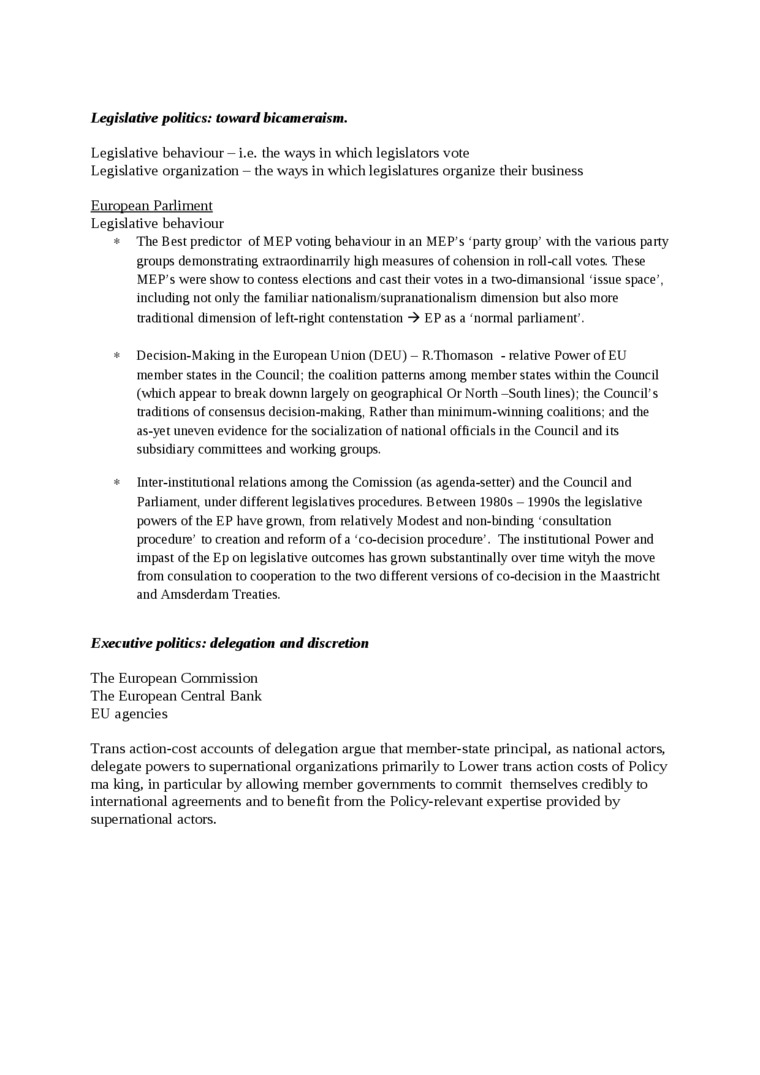95106

LegislaUve politics: toward bitum eraism.
Legislative behaviour - i.e. the ways in wliich legislators vote
Legislative organization - the ways in which legislatures organize their business
Eiironean Parli ment Legislative behaviour
* The Best predictor of MEP voting behaviour in an MEPs ‘party group’ with the vaiious party groups demonstrating extraordinamly high measutes of cohension in roll-call votes. These MEP’s were show to contess elections and cast their votes in a two-dimansional ‘issue space’, including not only the familiar nationalism. supranationalism dimension but also morę traditional dimension of left-right contenstation EPas a normal parliament’.
* Decision-Making in the European Union (DEU) - R.Thomason - relative Power of EU member States in the Council; tlie coalition patterns among member States witliin the Council (which appear to break downn largely on geographical Or North -Soutli lines); the Council’s traditions of consensus decision-making, Rather dian minimum-winning coalitions; and the as-yet uneven evidence for the socialization of nańonal ofhcials in the Council and its subsidiary committees and working groups.
* Inter-institutional relations among the Comission (as agenda-setter) and Ute Council and Parliament, under different legislańves procedures. Between 1980s - 1990s the legislative powers of the EP have grown, from reladvely Modest and non-binding consultation procedurę’ to creation and reform of a ‘co-decision procedurę’. The institutional Power and impast of the Ep on legislative outcomes has grown substantinally over time wityh die move from consulation to cooperation to the two different versions of co-decision in the Maastricht and Amsderdam Treaties.
Executive politics: delegation and discretion
The European Commission The European Central Bank EU agencies
Trans action-cost accounts of delegation argue that member-state principal, as national actors, delegate powers to supernational organizations primarily to Lower trans action costs of Policy ma king, in particular by allowing member govemments to commit themselves credibly to international agreements and to benefit from the Policy-relevant expertise provided by supernational actors.
Wyszukiwarka
Podobne podstrony:
■ The essay in włiich he describes tlie circumstances in which he composes famous
of labor law; and a lobbying body, in charge of the representation and the defense of the pharmacist
basicswitch dialog -=JZJ.x
Classroom Management ways in which studeni*s behaviour, movement, interaction is organized and contr
Controlling libmemcached Behaviors The behavior of libmemcached can be modified by setting one or mo
engaged fuli time and with fuli responsibility by the highest political-administrative body in the c
broad masscs, rejecting tcchnocratic-managerial oricntation towards profits and an absolutc market l
TOWARDS A DECARBONISED EU BUILDING STOCK:EXPERT VIEWS ON THE ISSUES AND CHALLENGES FACING THE TRANSI
tu ample wcmoniCTinon of the nornicy for (Kr politieal association of Eritrca with Ethiopia. The ćeJ
PPM IbT QU 1 concem of the politician. That suggestion we emphatically repudiate. The fate of a gr
skanowanie0047 (9) functioning of feedback mechanisms. This function exerts influence on the success
Zaproszenie Do Socjologii PDF eBooks Download afraid the engage in double downshift behavior to keep
■f fłowers pointing towards ihe upper edge of the stóragc sheet. The covering sheet can then be appl
PRZEGLĄDEUROPEJSKI Political and economic aspects of security i n the EU -theory and.practice 2020 B
f4 12 Create Foreign Key ZTXLFA1 -REGIO Short text Use the ualues in ztxlfa1cc to ualidate landl
więcej podobnych podstron